Respite care for your loved one
When a primary carer needs time away, live-in respite care ensures your loved one is supported at home with minimal disruption.
Learn how Elder makes it easy to find a trusted respite carer when it’s needed most.

Used by 5,000+ families across the UK
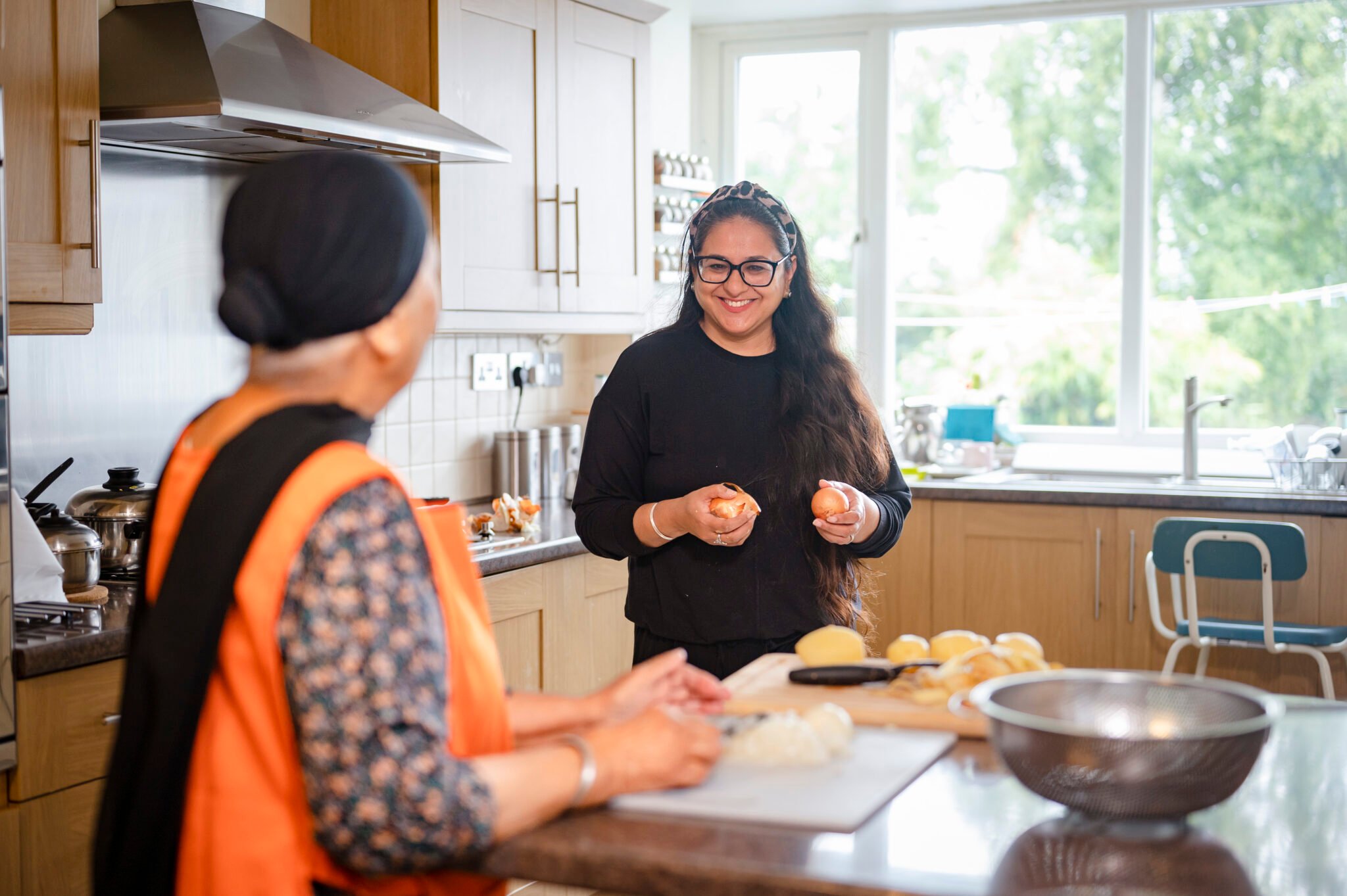
More value
On average, services facilitated by Elder are 35% cheaper than traditional alternatives.
More control
Set your care hours from our custom built app. Manage and collaborate care with family.
More choice
View carer profiles, read reviews from other families, and arrange a video/phone call ahead of placement.
More support
From our family support specialist to our in-house clinical team, we’re on hand if you need us.

What is respite care?
Respite care is a type of short-term care that allows a primary carer – whether a family member or a professional hired by the family – to take a break from their day-to-day responsibilities. While the main carer steps away, a trained professional temporarily takes over to ensure the older adult continues to receive high-quality support.
Respite care can last from a few hours to several weeks and may take place in the person’s own home through services like live-in respite care, or in a care home or day centre. It’s designed to prevent carer burnout, safeguard the wellbeing of everyone involved, and provide families with flexibility and peace of mind.
What are the different types of respite care?
There are several types of respite care available in the UK, depending on your loved one’s needs, preferences, and the level of care required. Each option offers short-term support to ensure your loved one receives the right level of help while their usual carer takes a break.
1. In-home respite care
The most flexible and least disruptive option, home-based respite care allows a professional carer to step in and support your loved one within the comfort of their own home. This means there’s no need to change routines, adjust to new surroundings, or deal with transport.
It’s a highly personalised type of care, tailored around your loved one’s preferences, lifestyle, and needs, ideal for those living with dementia or long-term conditions.
Care can be arranged for a few hours, overnight, or on a live-in basis, depending on how much support is needed. It’s also easy to arrange repeat bookings or plan in advance.
2. Residential respite care
Provided in a care home, nursing home, or residential setting, this option offers 24-hour support in a regulated environment. It may suit those recovering from a hospital stay or with complex medical needs. However, adjusting to a new environment, even for a short time, can be challenging, especially for those living with dementia.
3. Day centres
Day centres provide structured daytime activities, social interaction, and sometimes personal care. They’re often best suited to older adults who enjoy group settings and light stimulation. Some centres also offer transport, though availability and suitability can vary by location.
4. Respite holidays
Respite holidays offer a short break for both the person receiving care and their caregiver. Some hotels, retreats, and cruises now provide accessible accommodation and on-site care support. While enjoyable, these holidays typically require more planning, and not all are equipped to handle complex care needs.
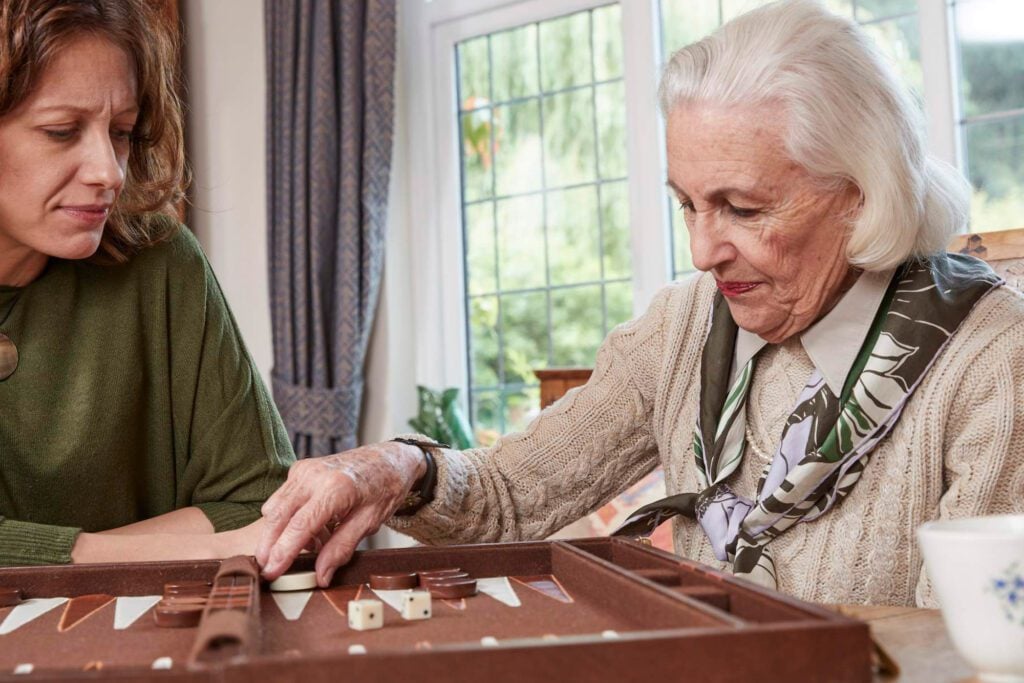
Why choose live-in respite care?
Live-in respite care involves a self-employed carer of your choice moving into your loved one’s home for a set period of time.
For elderly people with complex care needs, live-in care may support better peace of mind to concerned family members compared to visiting care or residential care. This is because they’ll have the full attention of one dedicated carer.
Elder can also support with emergency respite care. Our responsive service has connected families to self-employed carers in under 24 hours, and we can offer greater flexibility around start and end dates.
Respite care can last from a few hours to several weeks and may take place in the person’s own home through services like live-in respite care, or in a care home or day centre. It’s designed to prevent carer burnout, safeguard the wellbeing of everyone involved, and provide families with flexibility and peace of mind.
What are the benefits of in-home respite care?
Respite care offers essential short-term support for older adults, giving their regular carer – whether a family member or a professional carer – time to rest and recharge. Whether planned in advance or needed at short notice, respite care brings peace of mind and practical relief, while ensuring continuity of care for your loved one. Here are the key benefits:
1. Familiar, comfortable environment
With respite care at home, there’s no need for the person receiving care to adjust to a new setting. Staying in their own home means less disruption, which is especially important for older people and those living with conditions like dementia. It’s also one of the most personalised forms of care, tailored to your loved one’s lifestyle, preferences, and care needs.
2. It maintains routine and reduces stress
Unlike residential stays, live-in respite care supports the individual’s usual daily routine, helping reduce anxiety, particularly for those with memory loss or cognitive conditions. This is especially valuable for people receiving dementia respite care, where familiarity is vital.
3. Flexible to fit your schedule
Respite care can be arranged for a few hours, overnight, or for several days or weeks. It doesn’t need to follow a fixed pattern – you can arrange care for whenever you need a break, whether during the day, at weekends, or while you’re on holiday.
4. Cost and time effective
Choosing live-in respite care helps avoid the upheaval and expense of care home stays, including transportation costs and long waiting lists. And when you make repeat bookings with Elder, you benefit from a discounted rate, making it a cost-effective choice for families needing regular, short-term care.
5. Simple and convenient to arrange
Elder makes the process straightforward. You can pre-book multiple care periods in advance, manage everything online, and avoid unnecessary admin, so when the time comes for a break, you’re already prepared.
6. It supports carer wellbeing
Taking time off is not a luxury – it’s essential. Respite care allows the main carer to rest, focus on other responsibilities, or simply enjoy time to themselves, helping prevent burnout and ensuring they can continue providing support long-term.
Why is it important for carers to take a break?
A caring role can have big physical and mental health implications. Regular breaks ensure a carer has space to recharge their batteries, safe in the knowledge that a loved one is being well cared for. It helps to prevent caregiver stress and burnout, which over time may influence how you feel about the person you’re looking after.
41% of carers state they haven't taken a break in the last 12 months
60% are living with a long-term health condition or disability
29% often feel lonely due to their caring responsibilities
What does a live-in respite carer do?
A live-in respite carer temporarily moves into your loved one’s home to provide round-the-clock support while the usual caregiver takes a break. This type of care is highly personalised and designed to maintain continuity, routine, and comfort for your loved one.
Depending on your loved one’s needs, a live-in respite carer can help with:
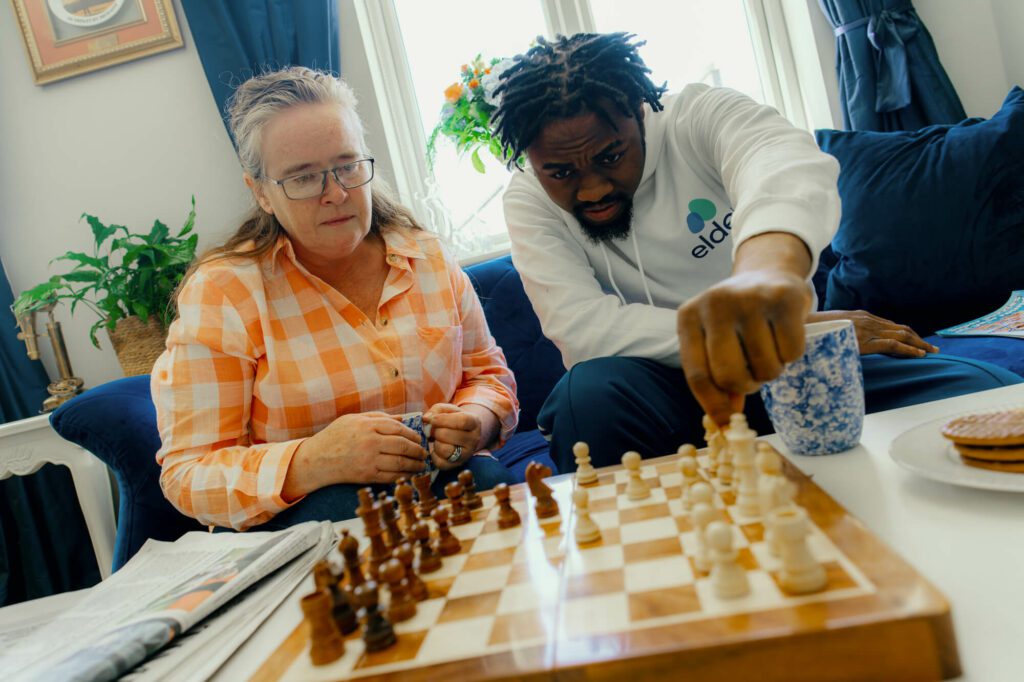




Glucose readings via finger pricks, Injections, Pessaries, Enemas, Suppositories

How does Elder compare to other types of respite care?

Live-in respite care provided in your loved one’s home
- For low to complex needs
- Daily activities directed by you
- One dedicated carer
- From 3 days+ at a time
- No waiting list
Day centres
Group-based support in a local community centre
- For low level needs
- Daily activities directed by centre
- Range of support staff
- From a few hours a week
- Requires GP referral
Care holidays
Specialist holidays for carers and their loved one
- For low to mid level needs
- Daily activities directed by holiday company
- Some support staff available
- From 1+ week on average
- Availability differs
Care homes
A short-term stay in a residential care home
- For mid to complex needs
- Daily activities directed by home
- Staff of carers
- Average 1week minimum stay
- Waiting lists
Hear from some of our respite care customers
We love sharing stories about how respite care has supported families across the UK. Hear from some of our customers and discover how a temporary carer helped their loved ones stay safe and comfortable at home, while giving primary carers the time and space they needed to rest and recharge.
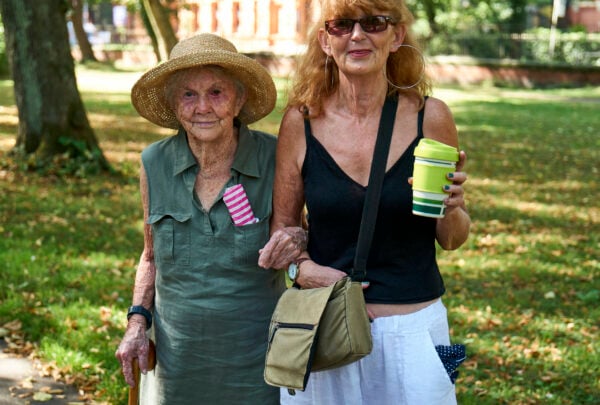
“Patience is a breath of fresh air! She is lively, cheerful and fun and brings joy to my in-laws' home. Nothing is too much trouble. She makes my mother-in-law feel like a princess.”
Louise

“David has been 400% better than I could ever have imagined. I have seen many carers over the years but David is in a break away Premier league. He is attentive, thoughtful, constantly looking to improve the situation.”
Matthew

“[Our carer] never underestimated mum's sharp intellect and desire to hold on to her independence. She and mum chatted about songs mum had always enjoyed, and she helped to create a special playlist for her."
Jane

“My mother has dementia and Maria quickly gained her trust...Maria cooks her delicious meals from scratch and keeps my mother busy with new card games. I have never seen my mother so happy.”
Alice
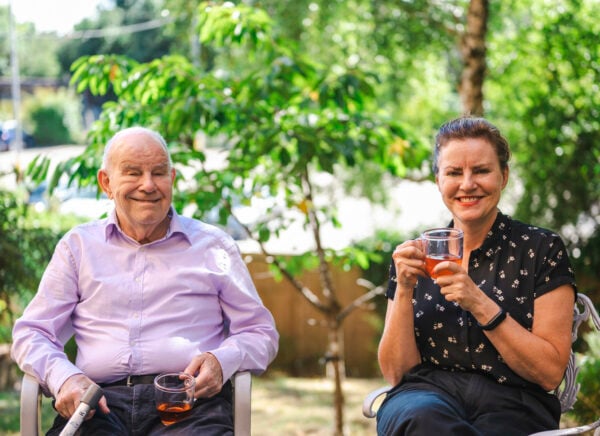
“She was a very friendly capable caring lady. My husband thought the world of her and has asked me if he can have her care for him the next time I am away which means a lot to me.”
Elizabeth

"Marko has taken the trouble to understand Ken's complicated needs, has become a good friend for Ken and is restoring some fun to Ken's life. For that we cannot thank him enough."
Alan

“Josephine has gone above and beyond. Every Wednesday she cooks a big meal and sets the table for Alison, her son Donald and his wife Annette, which is the highlight of the week and something they all really look forward to.”
Kyla
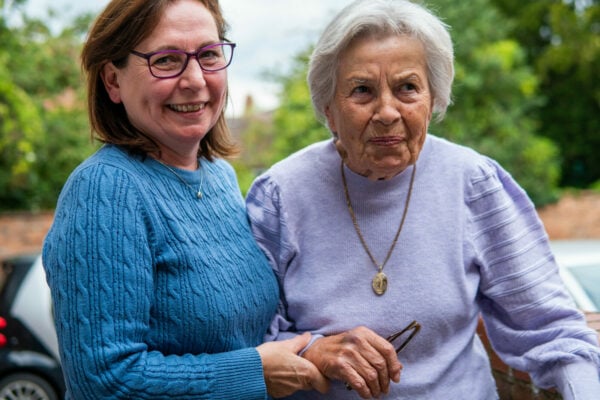
“Katie has made life easier and better for my gran from the moment she arrived. She has fitted in so well with our wee family and makes my gran feel special. ”
Angela
How much is live-in respite care?
With Elder, families pay £684+ for three days, and £1,595+ a week.
As with any type of care, there are funding options available. If you’ve not done so already, it’s worth asking your local authority for a care assessment. They’ll review your loved one’s needs and whether they’re eligible for financial assistance.
If you’re assessed as ineligible for help from your local authority, you may still be able to access help from a benevolent fund or charity. You can find information about possible funding sources from local carers’ groups, your GP, social worker or health visitor.
For more information, read our guide to the costs of respite care.
Looking for dementia respite care?
85% of us would want to stay in our own home if diagnosed with dementia. Elder makes this possible.
- We've helped thousands of families living with dementia
- We'll only match you to carers with dementia care experience
- We're part of Alzheimer's Society's Dementia Friends' initiative
How to arrange respite care: step by step
Before arranging respite care, it’s important to take a few key steps to ensure it meets your loved one’s needs and works for everyone involved.
Start with a family discussion
Talk openly with everyone involved in your loved one’s care. Consider their preferences, whether their home is suitable for in-home care, and how to maintain as much of their usual routine as possible while you or the primary carer are away.
Explore different care options together, such as live-in respite care, care homes, or day centres, to find what suits them best.
Check funding options and get a needs assessment
Contact your loved one’s local social services team to request a care needs assessment. If your loved one qualifies, a financial assessment will follow to see if they’re eligible for help with the cost of care.
Because this process can take time, it’s worth starting early. If you need support urgently, charities like The Carers Trust or Turn2us may be able to help with a short-term grant.
Consider a carer’s assessment
If you’re the primary caregiver, you may also be eligible for a carer’s assessment through your local authority. This can result in additional support, including respite care, and allows you to formally document how your caring responsibilities affect your daily life.
Create a contingency plan
Having a plan in place for emergencies can bring peace of mind, especially if you may need last-minute respite care. Your contingency plan should include:
- Emergency contact details
- Information about your loved one’s health and medications
- Their care preferences
- Your preferred respite care option.
If you use Elder, these details can be saved in your MyElder account, helping you arrange emergency care quickly and efficiently in the future.
Arranging respite care with Elder
We’ve built a platform that makes it easier for families and self-employed carers to find each other, build ongoing relationships, and access dedicated support when they need it.
1. Share your care request
Tell us your care requirements using our request form, including the type of care you’re looking for, any specialist skills you need, and what daily life looks like.
2. Select your carer
You’ll start receiving profiles of suitable self-employed carers within 24 hours. Chat to them online or arrange a phone or video call, before choosing who you like best.
3. Manage care
Once your agreement with your carer begins, use your MyElder account to chat with them and the Elder team, manage your schedule and care information, and find respite cover if you need it.
Practical support and financial help for carers
Read on for more information about the resources available to support carers when having a break.
Carer’s holiday grants
A number of charitable organisations have been set up to provide grants towards short breaks for carers across the UK.
These are available for low-income families, carers who would otherwise struggle to get away from their caregiving role, or those without a support network in place to help care for an elderly loved one.
- Ogilvie Charities – Grants of up to £300 to give a complete break to a carer.
- After Umbrage – Provides carers with free, four night breaks in a range of self-catering holiday cottages.
- The Respite Association – Provides free holidays and holiday grants for carers. They offer self-catering cottages in both Cornwall and Wales.
Carer’s assessment
Local authorities also have a duty to assess carer needs when requested. This may be in the form of a one-to-one meeting, telephone or online discussion between the carer and a trained professional, who will consider the impact of the caring duties on the individual and their life. They’ll also consider support options and provide their decision in writing following the assessment.
If the assessment determines that you have ‘eligible needs’, the council will be in contact with you to discuss what assistance may be available. This could be in the form of financial help or practical support.
Even if you’re not eligible for support from your local authority, getting an assessment can still be valuable as they can put you in touch with other agencies such as voluntary organisations who may be able to help.
Carer’s allowance
As a carer, you could also be entitled to a carer’s allowance which is a benefit specifically for informal carers who look after a person for more than 35 hours per week. If you find you’re ineligible for this, make sure you check whether Carer’s Credit is suitable.
FAQs about respite care
-
Why do they call it respite care?
The word "respite" means a short period of rest or relief from something challenging. In caregiving, respite care refers to temporary support that allows a carer to take a break – whether for a few hours, days, or weeks – while ensuring that the person they care for continues to receive safe, high-quality support. It’s called respite because it offers carers a chance to recharge, reduce stress, and look after their own wellbeing.
-
Who is respite care suitable for?
Respite care is suitable for older adults who need short-term support, whether due to illness, frailty, recovery from surgery, or changes in their regular care arrangements. It’s also ideal for people living with long-term health conditions such as dementia, reduced mobility, or other age-related challenges.
At the same time, respite care benefits primary carers by offering them time to rest, recharge, or focus on other commitments. It ensures the person receiving care remains safe, supported, and comfortable while their usual carer takes a well-earned break.
-
How quickly can you get respite care?
With Elder, you can get respite care within 24 hours. In urgent situations, we can even match families with a suitable carer on the same day.
-
Does the NHS pay for respite care?
In some cases, the NHS can fund respite care, but this usually applies when the care is needed for ongoing medical or complex health needs. If your loved one is eligible for NHS Continuing Healthcare (CHC), this can cover the cost of respite care, whether delivered at home or in a care home.
Eligibility is assessed by your loved one’s local Integrated Care Board (ICB) through a Continuing Healthcare Checklist, which looks at factors like mobility, cognition, medication needs, and overall health. If the care required is primarily health-related, a full assessment may follow to confirm funding support.
-
Is respite care a good idea?
Yes, respite care is often a very good idea for both your loved one and their regular carer. It offers a chance for carers to take a well-earned break, reduce stress, and avoid burnout, which in turn helps maintain a higher quality of care in the long term.
For your loved one, respite care – especially when delivered at home – ensures continuity, comfort, and safety. It also allows them to stay in a familiar environment with support tailored to their needs. Whether used occasionally or on a regular basis, respite care can strengthen relationships, improve wellbeing, and help everyone involved feel more supported.
-
Is there anything a live-in respite carer can’t do?
The live-in carers Elder works with are experienced, independent care professionals but they’re not registered nurses. While they can support with personal care, household tasks, companionship, and daily routines, there are certain medical tasks they can’t carry out. These include administering medication, stoma and catheter care, PEG feeding, and complex wound care.
Not sure if live-in respite care is right for your situation? Create your free MyElder account to speak with a Care Advisor – no pressure, just expert guidance.
-
What is the 28-day rule for respite care?
In the UK, the 28-day rule affects certain benefits like Disability Living Allowance (DLA), Personal Independence Payment (PIP), and Attendance Allowance if respite care is funded by the local authority. These benefits may be suspended if the person receiving care stays in a care home for 28 days or more, either in one stay or across multiple stays with gaps of 28 days or less between them.
Time spent in hospital before entering a care home also counts towards the 28 days.
However, the rule does not apply if the person is self-funding their care or if there are 29 days or more at home between respite stays.
-
What happens if I don’t know how long I’ll need short-term care for?
Sometimes it’s difficult to know how long you’ll need care for, for example if the person who normally provides care falls ill, or if additional support is needed to support recovery after an illness or operation.
With Elder, you can book a period of short-term care with a rough end date. Simply give us a call and let us know if you need to extend or amend your dates.
-
Can I book the same carer each time?
If your preferred carer is available, then yes. It can help to book multiple periods at once if you can, to ensure your requirements can match up with your carer’s schedule.
-
Do I need to resubmit my information when rebooking care on MyElder?
Not at all. Your MyElder account is a living document – it’ll exist for as long as you need it. All you’ll need to do when booking future care is check that the information in your care profile is still correct, and update any areas where the care needs have changed.
-
How do I manage my care?
Your MyElder account has been built to be your all-in-one care management platform. With it you can:
- Add other family members to get them involved in the arrangements
- Communicate with your carer and the Elder team via Elder chat
- View your schedule and plan handover days when your carer takes a break
- Read updates from your carer with the Care Logs feature
- Keep the care profile up to date to reflect any changes to your care needs
- Easily update payment information and track your invoices.
-
How do I find the most suitable respite care near me?
To find suitable respite care near you through Elder, simply fill in our request form to share your care requirements, including the type of care needed, specialist skills (if any), and a description of your loved one's daily life. Based on your information, we will match you with potential carers, and you can then review their profiles, chat online or arrange calls to select the best match.





